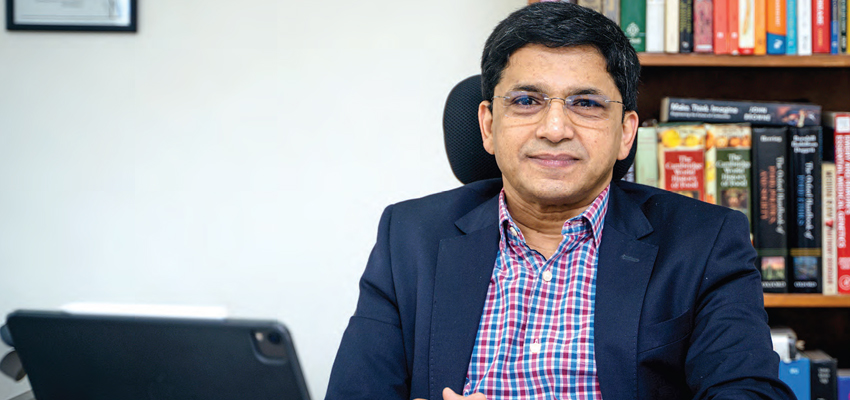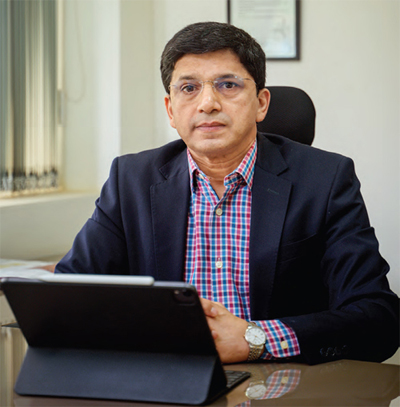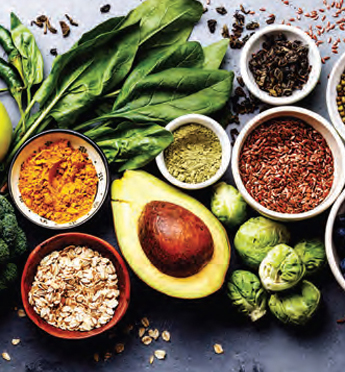The Food Evangelist

If there is one thing the pandemic has taught us, it is the importance of being healthy and eating healthy. One man who has been way ahead of the curve in anticipating this change is Raghu KC, Managing Director, Pristine Organics. His path-breaking work in the field of food and nutrition has helped him not just establish a thriving food brand synonymous with health, it has also helped him save thousands of lives with his carefully crafted medical foods for patients with rare genetic disorders. As one of the earliest proponents of organic foods in India, he has a bird’s eye view of the seismic shift in people’s awareness and preference for healthier foods. Corporate Citizen sits with Mr Raghu for a chat about his journey to the top, his many innovations in the field of food and nutrition, and some of his greatest achievements
"There are a lot of unmet needs in a country as vast and diverse as India. Whether it is education, quality of life or health, there is still plenty to be done. I would advice youngsters to look closely at these needs and see what it is that they can do to meet them"

Corporate Citizen: Tell us about your formative years.
Raghu KC: After finishing my graduation, I started working as a chemist. While working, I also did a course in the Central Food Technology Research Institute. While doing routine analysis, I was clearly able to see the kind of adulteration and quality issues that were present in foods available in the market. I was also able to see through the false claims that food manufacturers mark on their labels. That was a kind of trigger for me to contemplate whether I could do anything in order to fill those glaring gaps.
CC: In 1992, you founded Pristine Organics. How did that come about?
I saw that there is an opportunity to make better quality food products. We started with micro-nutrient pre-mixes. I found that many of the premixes available in the market were not adhering to the regulatory standards or were not in line with the nutrient recommendation of Indian Council of Medical Research (ICMR). That is how I felt that I could fill the gap and being an analyst, I was able to understand technically how to do it. The trigger for this came from my job as a chemist but I have always been a voracious reader. My reading in food was very vast and I was writing articles on food in several papers at that time. My interest in food was very deep.
CC: In the early 90s, the dietary habits of Indians weren’t very healthy. At this time, how did you envisage a market for Pristine Organics?
At that time, I did not exactly envisage Pristine as a company in the organic category per se, but the sensitisation had happened in the Indian public at that time. In the US, this change had started in the 70s when Rachel Carson wrote a book called ‘Silent Spring’. This is an acclaimed environmental book about a silent spring where there are no birds to sing because many of them had died due to pesticides. Her book had sensitised the world and in popular media, there was a lot of discussion about what pesticides are doing to our health and environment. In the US, there were a lot of discussions on this and the Environmental Protection Agency (EPA) was made very strong. In India too, the sensitisation of the public vis à vis pesticides and fertiliser residue was happening. At that time, I pitched in that foods, especially for infants, should be free from toxic residues because the infant body is small, highly vulnerable and cannot detoxify on its own as an adult body can.
CC: You write for publications and you also give public talks. One thing you keep saying is “Communicating science, in particular health science, to common people in an easily understandable way is important to empower them”. Is this easier said than done? In a country like India where scientific temperament isn’t widespread, is that easier said than done?
You are right. John Kenneth Galbraith, former US ambassador to India and also a great economist, wrote a book called The Affluent Society, in which he used to say “Whatever you say about India, the opposite is also true”. Indians are very paradoxical. They do believe in science. If you look at vaccine hesitancy, it is not as strong in India as it is in the US. In the US, there is the anti-vax group, flat earthers, QAnon. In India, there are not as many conspiracy theories. Indians are very spiritual but they also believe in science. The way you communicate science is very important. You need literature to communicate science. That is how I have been able to blend literary metaphors to communicate science to the common man.
CC:Pristine Organics is the sole provider of some critical nutritional supplements and in an interview of yours which I read, you had mentioned that these supplements have saved over 500 lives in India. Tell us about this.
It is actually over 5000 lives that we have managed to save. There are some diseases where some internal beam is switched off, so the patients (usually children) are not able to metabolise, i.e., break down food components, whether they are fats, amino acids or sugar. These toxins then build up over time and the patient dies within a year. Unfortunately, for these children, nourishment is also poison. So, I had to design a diet which their bodies will be able to metabolise. I tried it first on a child, who not only survived but is now a healthy 12-year-old girl. The story started from here and the news spread across doctors, hospitals and the scientific community, and AIIMS, among other institutions. This caught on very well, as there was a great need at that time for this type of medical food for children. There were medical foods available at that time but they were imported by MNCs and it would be at an exorbitant cost of Rs.30,000 per child per month. Poverty being widespread in India, not many could afford this expensive diet. But I was able to bring the same medical diet to children for only Rs.2000 a month. This made it affordable for all children, not just the rich. I am very proud of this product because my knowledge and research became useful in saving the lives of children.
"There is a major shift happening towards plant-based protein. You may have seen that plant-based meat is a big business and we are very interested in that area and have been investing in that business"

CC: Has the pandemic affected the way you do business?
There has been a metamorphosis since the pandemic started. Covid-19 unleashed a very disruptive situation. I for one, always preferred physical books. I had never read a book on Kindle. But since the pandemic, I now have 2500 books on my kindle. The option in front of all of us now is to either adapt or be extinct. Today, B2C business and online business has exploded, you are able to directly connect to the consumer. Nowadays, consumers use digital means to seek out the product they have a need for. In the earlier days, you would never know who is seeking out your product. Today, there is a greater awareness about wellness and greater ease for seeking out products. Thanks to the networked world, you can connect yourself. Of course, it goes without mentioning that our traditional trade is always there. Our kirana stores of 120 million will continue to exist. They are not going to go away. Pristine organics too, has products in 30,000 kirana stores and 15,000 pharmacies, and we are also present in all the major e-commerce sites.
CC: Are you primarily present in Karnataka?
We are present in several states. If you go to Big Basket or Amazon or other e-commerce sites, you can order our products there.
CC: Did you see an explosion in demand for vegan or ketogenic products after the renewed focus on health during the pandemic?
There is a major shift happening towards plant-based protein and plant-based products. You may have seen that plant-based meat is a big business and we have been very interested in that area and have been investing in that business. There has also been a lot of focus on animal welfare from the ecological point of view, motivating many people to opt for a plant-based diet. There have been a lot of articles that I have come across which state that plant-based foods are better in terms of disease prevention and health promotion. That has to be further analysed whether it is because of the method of animal farming or the meat itself. There are still some questions there that need to be answered. But overall, since the pandemic began, there has been a much greater interest in plant-based and vegan foods.
CC: Prior to the pandemic, the health supplement and nutraceutical industry was poised to grow to $10 billion by 2025. Do you feel that is still achievable?
The target is still achievable. What has happened is that there is a growing realisation among people that it is very easy to say that you need to have a diversity of diet but if you look at the food ecosystem that is present in our country, it is far easier said than done. Normally in foods, there are 3As to consider. What is Available, what is Accessible, and what is Absorbed. What is available in the ecosystem currently, is still not conducive for health promotion in terms of diversity of diet. When you don’t have a diversity of diet, there are dietary gaps in terms of nutrient intake. On the other hand, today you are growing quantity without quality. The food we are eating may be filling our belly but it may not be meeting all of our nutritional needs.
CC: The US, for example, has a huge obesity problem. Does India have a similar issue or do we struggle more with malnutrition?
India is growing obese at a very alarming rate. If you look at the recent statistics, you will find that while malnutrition is at 35% in children aged under 5 years, the growth in obesity is at 12% among children of the same age. Of course, it is still not at 60-70% as you see in the west but the west has learnt from its mistakes. In the US, obesity is now declining, whereas, in third world countries like India, it is on the rise. The problem with America was that it became a fast food nation but it is paying more attention to the dietary habits of its people now.
"India is growing obese at a very alarming rate. If you look at the recent statistics, you will find that while malnutrition is at 35% in children aged under 5 years, the growth in obesity is at 12% among children of the same age"

CC: You have had a long and successful career. What are some achievements which you are most proud of?
I mad met the former Chief Scientist at the World Health Organization, Soumya Swaminathan in Delhi and she told me that she was so happy to see an Indian company saving children’s lives. That was a very proud moment for me. When I see happy parents, it is a great moment for me. A parent from Jaipur brought along his child to see me in my office. He was so happy because of our affordable food. I felt elated that my knowledge has been able to help people. When I started producing organic food, I remember sitting in a hotel and there was a kitty party being held at a table next to me. The ladies were talking about baby food. One lady was saying that she gives her child only organic food and she only gives him 1st Bites (a product of Pristine Organics). I felt very happy at that moment. There have been several moments like that. Another thing I am proud of is when I made a product for HIV patients around 15 years back. At that time, HIV was very rampant in the country. HIV patients were also very ostracised and stigmatised. I remember visiting an HIV care centre and the doctor told me that the patients’ immune cell count was increasing because of the food supplement I made for them. I met a few patients and I could see the laughter on their faces. I felt very happy and connected that our work was having a direct impact on vulnerable people. Today, HIV is very manageable and the quality of life of patients has improved but 15 years ago the awareness wasn’t that great.
CC: What is your idea of relaxation?
Reading is everything to me. I read all the local papers as well as international papers every day. I also read all the science journals and I also read a lot of literature. I particularly love reading science journals. It helps me keep a track of how things are changing in the rapidly evolving science world. I am fonder of reading journals than reading magazines. I do yoga, I am also deeply fond of philosophy.
CC: What advice would you give to budding entrepreneurs who are just starting their career at a very difficult time?
There are a lot of unmet needs in a country as vast and diverse as India. Whether it is education, quality of life or health, there is still plenty to be done, as we have encyclopedic problems. I would advice youngsters to look closely at these needs and see what it is that they can do to meet them. Explore life. Take an unproven path, don’t take the proven path. Explore the world. There is nothing in this world like entrepreneurship. In entrepreneurship, you really confront reality.
CC: You were planning to expand Pristine Organics abroad. How is that plan coming along?
The plan is coming along very well. We are almost finalising a distributor in Russia. We are already there in Ecuador, Malaysia, the Philippines and Indonesia. Organic as a value-added product, I believe can go far and well.
CC: Many companies are going public in recent times. Do you see Pristine Organics launching an IPO in the near future?
Very much. Down the line in the next 2-3 years, we should be clocking Rs.500 crores in revenue and then we intend to go public. We plan to touch Rs.300 crore by next year itself.